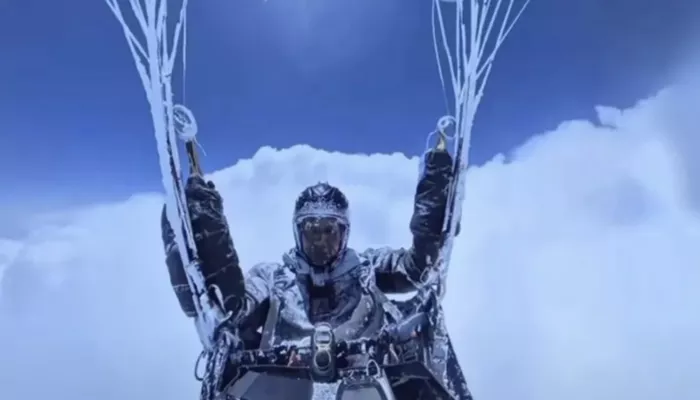Local authorities have launched an investigation following a remarkable incident involving a paraglider who was pulled into a cloud and carried to an altitude of 8,598 meters in the Qilian Mountain region, located between Northwest China’s Qinghai and Gansu provinces.
The incident occurred on Saturday, when the paraglider, taking off from over 3,000 meters above sea level, lost control and was swept upward by strong air currents inside the cloud. According to Guangming Daily’s report on Tuesday, the paraglider experienced a sudden ascent exceeding 5,000 meters, reaching the extreme height of 8,598 meters.
Video footage captured the entire event, showing the paraglider suffering severe frostbite while remaining conscious.
Despite the extreme conditions, he managed to maintain control of his parachute until he landed safely.
In the video, the paraglider described experiencing hypoxia—a dangerous lack of oxygen—and revealed that he had forgotten to put his hands back into his gloves, exposing them to the brutal cold. “I just kept communicating over the radio the entire time,” he said.
An experienced paraglider, known only by the surname Ou, explained that cold-weather gear is essential at 2,000 meters, where temperatures are already low. At 8,000 meters, temperatures can drop to around -40 degrees Celsius, with oxygen levels dangerously low. Ou added that while similar cloud suction cases reaching between 6,000 and 7,000 meters have been recorded worldwide, survival at such altitudes is rare. “This is truly miraculous. His mental resilience was extraordinary,” Ou commented.
However, a source familiar with the situation told Jiupai News that although the paraglider held a valid license, he failed to file the required flight plan or obtain airspace clearance for the launch site on that day.
Authorities are investigating possible violations of aviation regulations. According to national aviation sports rules, all aerial activities must receive prior approval from air traffic control. Failure to comply can lead to corrective actions by local sports administrations, including warnings, fines, or in severe cases, criminal charges.

